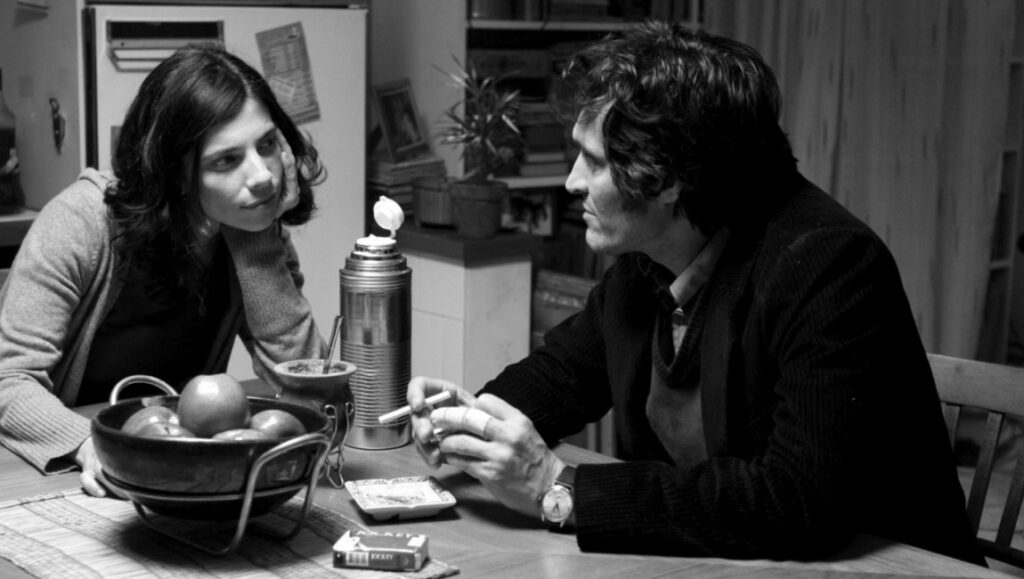Francis Ford Coppola’s Youth Without Youth didn’t do his career many favors. At least not from audiences and critics that were confounded by the seemingly incomprehensible nature of the film’s metaphysical doppelganger themes of everlasting life, etc. However, it facilitated Coppola’s return after a ten-year sojourn tending to his vineyards and struggling to complete his ambitious and still-uncompleted magnum opus Megalopolis, and we welcomed his return. For the unimaginative stiffs that couldn’t hang with Youth (which wasn’t as convoluted or cryptic as some thought), Tetro seems more appealing: a family drama about a young man (Alden Ehrenreich) who travels to Argentina to find his estranged brother (Vincent Gallo) who has changed his name, become a poet and has seemingly done everything in his power to separate all ties from his family. Charming, scrappy and ultimately uneven, Coppola’s Tetro may not be a return to form, but as frustrating as its theatrical flourishes can be, there’s many endearing qualities to the film, including moving resonance in a complicated family dynamic.
Tetro is neither the whimsical Fellini-esque film or the Italo-comedy hinted at in the trailer (though the film does contain some of these qualities). It’s characterized by scenes mostly shot in black and white, color flashbacks, stylized daydreams and existing footage of old school cinema (remembering scenes of watching Michael Powell & Emeric Pressburger’s Tales Of Hoffman, and references to the Archers’ The Red Shoes), and sometimes takes on more style than it can chew and the mixed medias don’t necessarily strengthen the picture. But Tetro is, at its core, a family drama about a man, Angello (Gallo), who has acrimoniously divorced himself from his family and cannot reconcile his buried affections with his bilious bitterness. When cruise ship waiter Bennie (Ehrenreich) arrives in Buenos Aires unexpectedly, his ship moored in Argentina for a week due to engine difficulties, he tracks down and finds his perennially irritable brother Angelo, now going by the name Tetro (which fittingly means brooding and gloomy in Italian), and refusing to discuss the past despite Bennie’s myriad questions. Tetro is a great writer, but known as someone who hasn’t fulfilled the promise of his talents; he’s a “genius without accomplishments.” Meanwhile, Miranda (Maribel Verdu), Tetro’s live-in girlfriend, is welcoming to the naive 18-year-old, but she too is in the dark about Tetro’s past and hints to Bennie that expecting to get anything out of his curmudgeonly brother may be a lost cause. On his first evening, Bennie, who clearly looks up to his brother, reveals his heartache; a tattered letter from his youth written by then 20-year-old Tetro apologizing for abruptly leaving home, but signing off with a promise — obviously never fulfilled — to come back one day and “rescue” him from their overbearing and unctuous famous composer father. Despite Tetro’s “rules” and insistence on stonewalling his brother’s queries, the ever-curious Bennie keeps burrowing for more and goes as far as to rifle though Tetro’s personal things, finding a coded, cryptic story about their father. As Bennie digs deeper into his past — the knowledge of which he feels entitled, “It’s my story too,” he protests to Tetro — the more vexed the querulous and outraged Tetro becomes. “Love in our family is like a quick stab in the heart,” he spits with venom when Miranda asks if he loves his family. Without giving away too much, serious injuries, major miscommunication and a revived Tetro story with a now completed ending come to pass (against his wishes of course) and Bennie soon discovers a deep, dark family secret that leaves him completely disarmed.
As Bennie, Ehrenreich is a revelation, as many have suggested; he’s the heart of the picture’s nostalgic and wistful tone. But Gallo is equally impressive, conveying a wonderfully complex and wounded man who carries a burden of anger, emotional scars and yet has a generous, loving soul despite the baggage. There’s a solid cast of Spanish all stars featured too, including Carmen Maura (Volver) and Maribel Verdu (Y Tu Mama Tambien, Pan’s Labyrinth), plus Argentinean actors like Rodrigo De La Serna (the best friend of Che Guevara in The Motorcycle Diaries), and these performances and players are certainly the film’s greatest strength and lesser actors might not have been able to sell every scene with such palpable emotion and passion. Coppola has said he wants to tell personal stories, yet he slightly undermines his intentions with the impersonal, almost fantastical operatic flashbacks-cum-dream sequences that, while seemingly part of the grand nature of the story, feel a little alien. In its final act, the picture takes on elements of a Greek tragedy, but fortunately Coppola reigns its conclusion in, saving itself from wanton melodrama that it threatens at. Again, the venerable filmmaker has said the film is not autobiographical, so it’s to his credit that most of it does feel so warm and very personal. And while largely uneven, there’s a spark and charm to Coppola’s Tetro that some will likely dismiss, but others will hopefully see for what it is; a flawed little jewel, hopefully preceding a fully realized gem from Coppola sometime in the near future.


Comments are closed.